
The special academic and cultural program honours the legacy of the Nobel Prize while marking 55 years of diplomatic relations between Sweden and Vietnam and 25 years of RMIT’s presence in Vietnam.
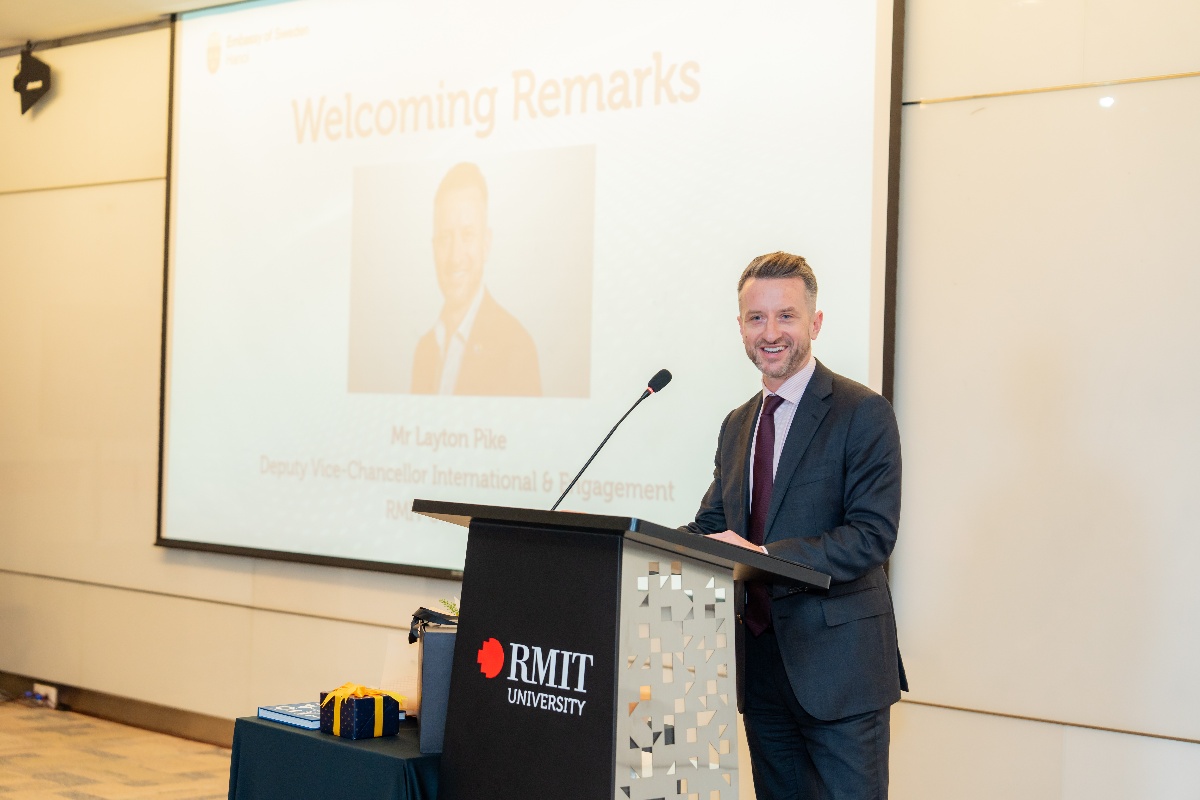 Mr Layton Pike, Deputy Vice-Chancellor International and Engagement, RMIT University, delivers his speech. (Photo: RMIT)
Mr Layton Pike, Deputy Vice-Chancellor International and Engagement, RMIT University, delivers his speech. (Photo: RMIT)
The exhibition The Nobel Prize, produced by the Swedish Institute, introduces the history of the award, its milestones and the ground-breaking scientific and cultural achievements it has recognised. Over nearly two weeks, it offered students, educators and the wider community new perspectives on the contributions of Nobel Laureates in addressing global challenges.
The highlight of the programme was the Nobel Prize Dialogue on the afternoon of 15 September, themed AI’s Role in Future Learning and Teaching. Delivered in a hybrid format, the event attracted approximately 300 participants, including senior representatives from the Embassy of Sweden, international scholars, industry leaders and RMIT students.
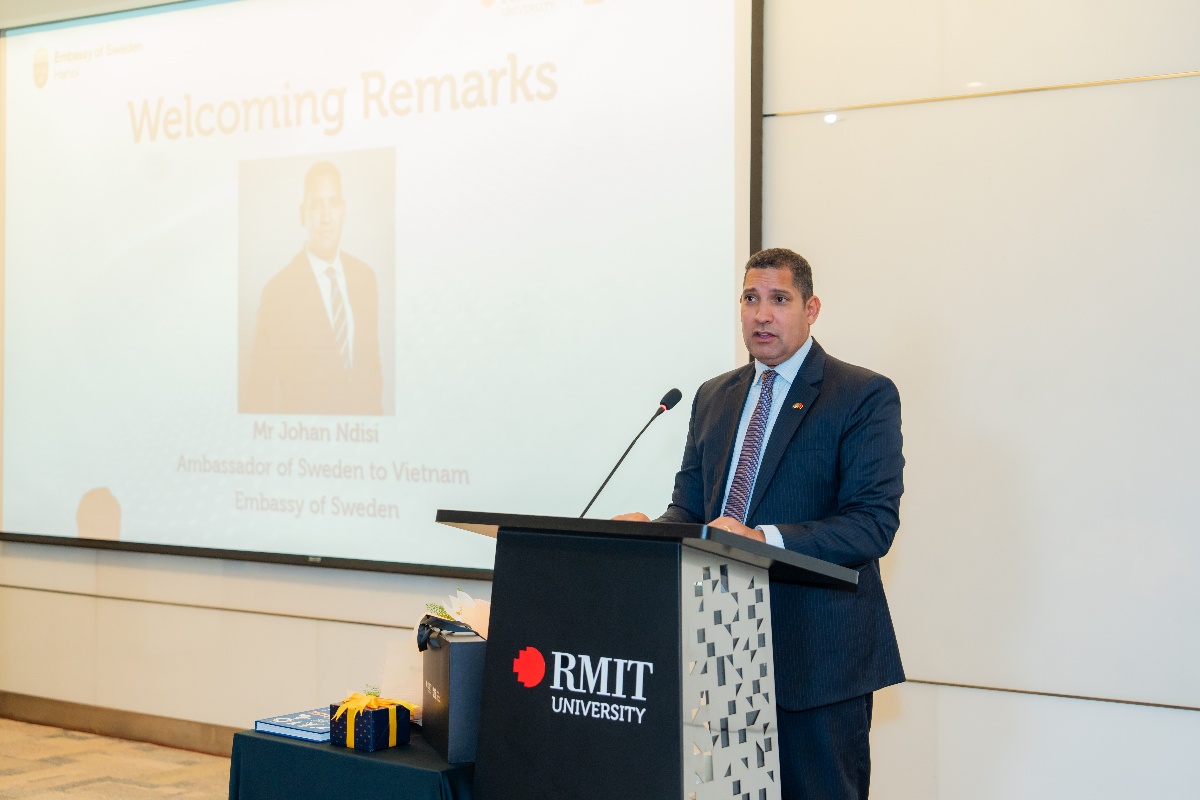 Mr Johan Ndisi, Ambassador of Sweden to Vietnam, delivering the welcome speech. (Photo: RMIT)
Mr Johan Ndisi, Ambassador of Sweden to Vietnam, delivering the welcome speech. (Photo: RMIT)
Joining virtually from Sweden, three renowned Swedish academics delivered keynote lectures that together spanned the history of the Nobel Prize, the process of selecting a Physics Laureate, and the need for a responsible approach to artificial intelligence. Dr Gustav Källstrand, Senior Curator at the Nobel Prize Museum, provided insights into how the prize has been managed and its evolving public image.
Professor Ulf Danielsson, theoretical physicist at Uppsala University and member of the Nobel Committee for Physics, offered a behind-the-scenes look at the selection process and reflected on the 2024 Nobel Prize in Physics, awarded to artificial intelligence and machine learning. Closing the session, Professor Virginia Dignum, Professor of Responsible Artificial Intelligence at Umeå University, emphasised the importance of ensuring AI development is trustworthy, cooperative and socially responsible.
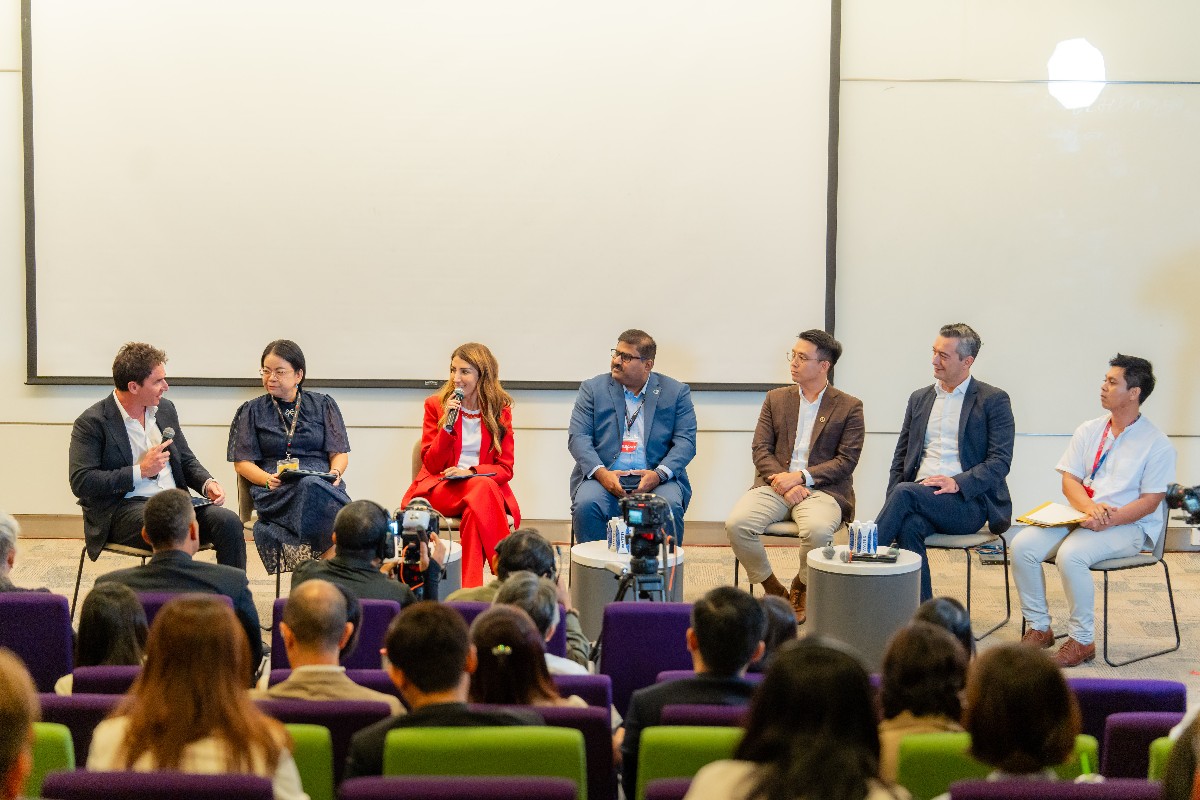 The panel discussion brought together experts from the Ho Chi Minh City Digital Transformation Centre, Ericsson, Tetra Pak and RMIT Vietnam to discuss AI’s impact on education. (Photo: RMIT)
The panel discussion brought together experts from the Ho Chi Minh City Digital Transformation Centre, Ericsson, Tetra Pak and RMIT Vietnam to discuss AI’s impact on education. (Photo: RMIT)
Building on these perspectives, the dialogue culminated in a panel discussion featuring experts from the Ho Chi Minh City Digital Transformation Centre, Ericsson Vietnam and Myanmar, Tetra Pak Vietnam, and RMIT Vietnam. The conversation explored how AI is transforming teaching methods, the digital skills learners will require, challenges around personal data, and emerging models of collaboration between government, universities and industry.
Sweden’s Ambassador to Vietnam, Mr Johan Ndisi, remarked: “The Nobel Prize stands as a beacon of human achievement and global cooperation. This dialogue and exhibition celebrate innovation while reinforcing Sweden’s support for Vietnam’s digital transformation. As Vietnam advances under Resolution 57, embracing science, technology, and AI as drivers of national development and growth, this event offers a timely platform to inspire young minds and strengthen our bilateral ties.”
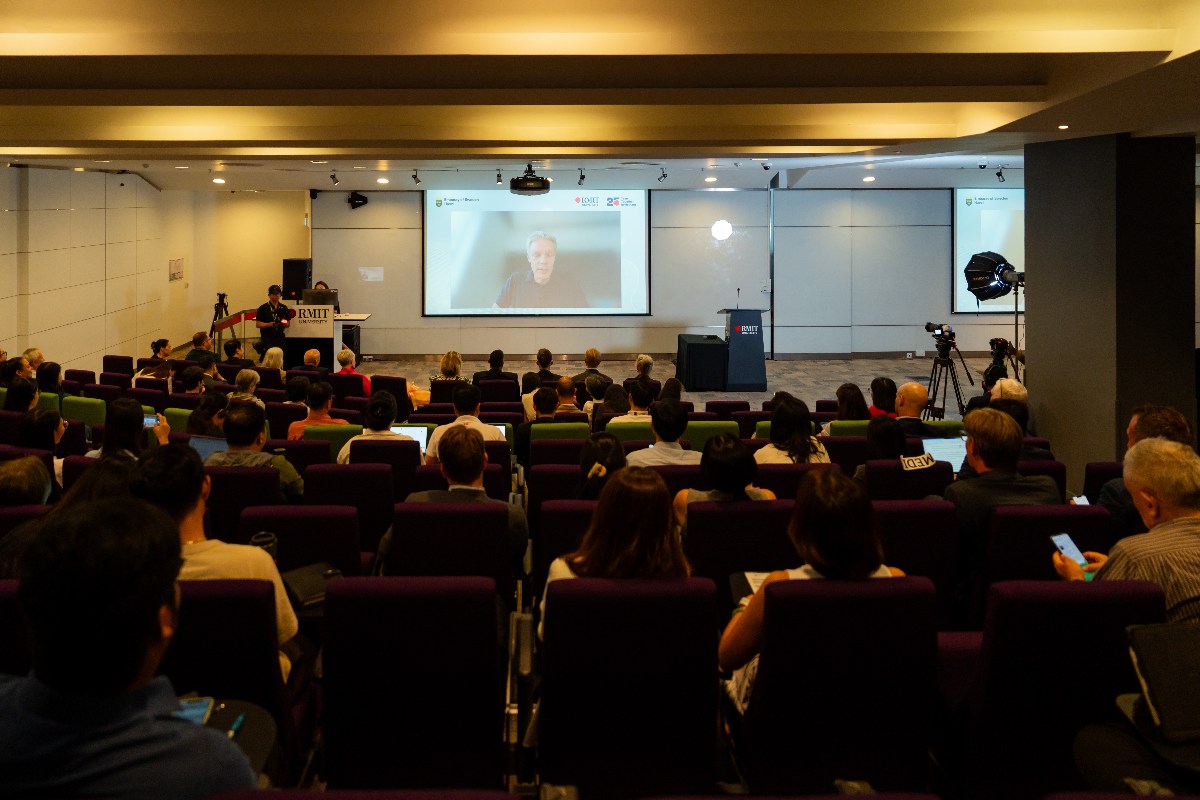 Participants attending the keynote lectures of the Nobel Prize Dialogue 2025 at RMIT Vietnam. (Photo: RMIT)
Participants attending the keynote lectures of the Nobel Prize Dialogue 2025 at RMIT Vietnam. (Photo: RMIT)
Mr Layton Pike, Deputy Vice-Chancellor International and Engagement, RMIT University, added: “The spirit of excellence and innovation that the Nobel Prize represents is a powerful inspiration for all of us and at RMIT we share that commitment to pushing the boundaries of knowledge and nurturing the next generation of visionary leaders, researchers, and entrepreneurs.”
The event also reflected a new chapter in bilateral cooperation. In June 2025, Swedish Prime Minister Ulf Kristersson and Vietnamese Prime Minister Pham Minh Chinh signed a Sectoral Strategic Partnership to strengthen collaboration in science, technology, innovation and digital transformation. This year’s exhibition and dialogue brought that agreement to life, reinforcing Sweden’s long-standing role as a partner in Vietnam’s development journey – from humanitarian support to cutting-edge collaboration in green technology and artificial intelligence.
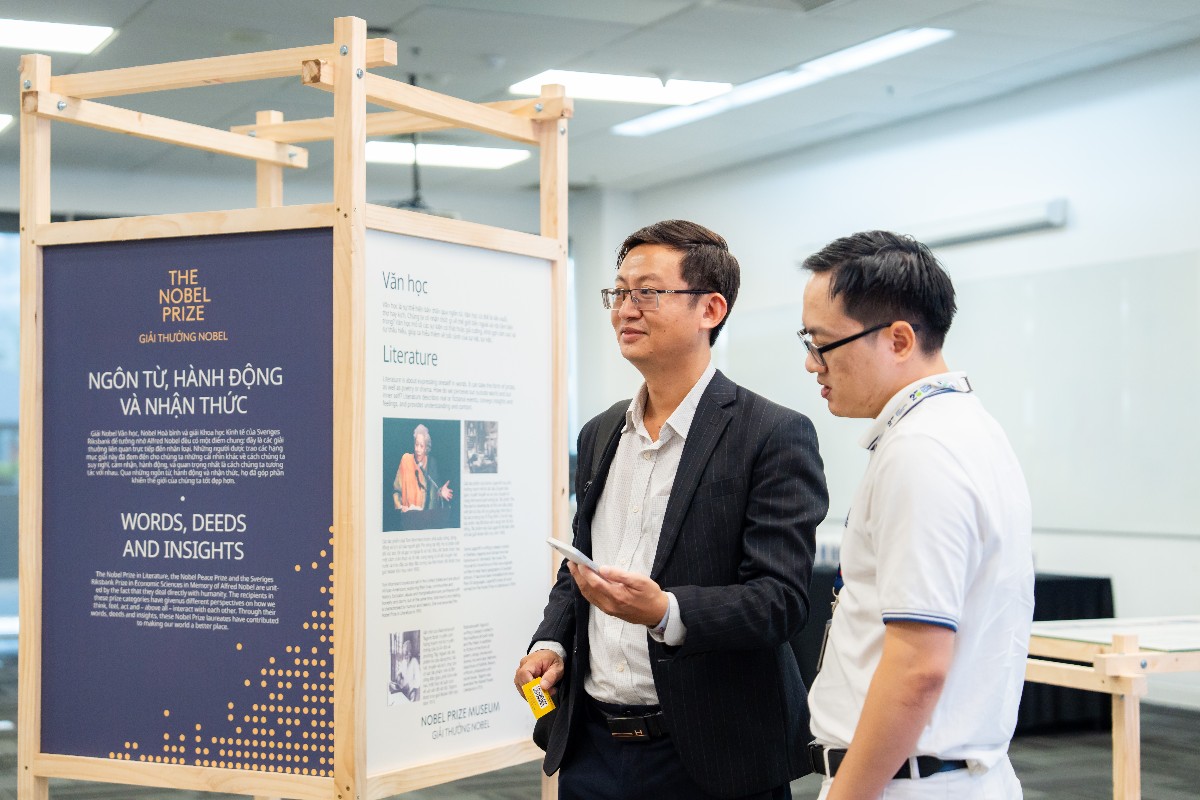 Visitors exploring displays at the Nobel Prize Exhibition produced by the Swedish Institute. (Photo: RMIT)
Visitors exploring displays at the Nobel Prize Exhibition produced by the Swedish Institute. (Photo: RMIT)
At the same time, the programme aligns with Resolution No. 57-NQ/TW of the Politburo (December 2024), which identifies science, innovation and digital transformation as drivers of Vietnam’s national development. By 2030, Vietnam aims to increase R&D expenditure to two percent of GDP, expand its digital economy and position itself as a regional hub for AI and advanced technologies. The Nobel Prize Exhibition and Dialogue 2025 contributes to this vision by inspiring young people, encouraging university-industry cooperation, and fostering a culture of innovation.
Hosting the Nobel Prize Exhibition and Dialogue 2025 reaffirmed RMIT Vietnam’s commitment to advancing education and research excellence at the highest level. The event provided a platform for global experts and local leaders to exchange insights and highlighted RMIT’s role as a university of impact in Asia Pacific, nurturing the next generation of visionary leaders while fostering an environment where innovation, education and international cooperation can thrive.
Story: Quan Dinh H.
A UN Women-RMIT partnership is helping advance leadership capability and support Vietnam’s SME development agenda.
RMIT Vietnam continues long-term commitment to talent development with its record 2026 Scholarship program worth more than 200 billion VND.
A study has revealed a growing gender divide in Vietnam’s anaemia burden, with rates rising among women while steadily declining among men.
Co-organised by the Ministry of Education and Training (MOET) and RMIT Vietnam, the Vietnam Education Festival on AI and Digital Innovation 2025 created a nationwide platform for teachers to connect, learn and share best practice.